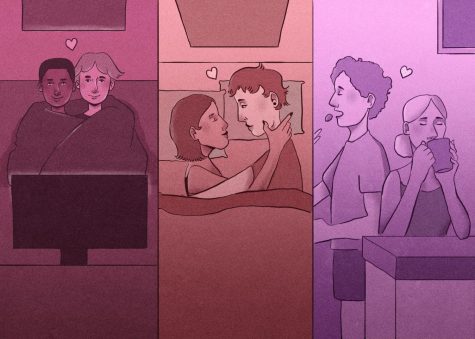Closing the curtain: The importance of aftercare post-sex
January 31, 2023

SEX ISSUE
Like a play, sex has a beginning, a middle and an end. The end of sex is called aftercare, and it involves sexual partners checking in and supporting each other’s needs.
Though aftercare originated in the BDSM and kink community, it can be a part of all sexual experiences.
Rachel Zar, licensed marriage and family therapist and certified sex therapist, said sex is not a complete experience unless there is aftercare involved.
“Because the physical intimacy of sex is just as important as the emotional intimacy of sex, aftercare helps us to deal with any emotions that come up, to counter any sexual shame that there may be, to ground ourselves if we’re feeling any post-coital dysphoria (PCD), and to increase our feeling of connection with our partner.”
During sex, several hormones, such as dopamine, are heightened. When the sexual experience ends, however, Zar said oftentimes people experience a crash, which can manifest into PCD.
PCD causes negative emotions like sadness and anxiety after a consensual sexual experience. According to a study by the National Center for Biotechnology, 46% of respondents experienced PCD symptoms at least once.
“If you just had sex with this person and immediately after sex ends, they just roll over and start to do something else, it’s almost like they’re abandoning the moment, like they’re not really present with you,” Zar said. “They’re not helping you transition and you’re not helping them transition from this playful space back into reality, and that’s what’s really important.”
Zar said aftercare can be a variety of things, including: cuddling, kissing, having a snack, rehydrating, watching a movie together, showering, taking care of any injuries, or even having a simple conversation.
First-year Jamie Davis, whose major is undecided, believes there is a lot of shame surrounding the topic, which leads to miscommunications between sexual partners.
“I think we need to change the way we socially talk about sex,” Davis said. “Even though we’ve tried to come very far, I feel there’s [still] discomfort about it. I think that everyone would benefit from just being more honest and more open about things.”
To practice aftercare, Zar recommends self-advocating for the type of aftercare you want. If you do not feel comfortable asking someone for aftercare, Zar recommends considering if that is a safe person for you to be vulnerable with.
For Davis, sex has been like a “double-edged sword” because of a combination of negative and positive experiences. Though they have only experienced true aftercare once, they enjoy talking about the experience after. Going forward, they will try to discuss their wants and needs before sexual experiences.
“I’m trying to be more honest about these experiences,” Davis said. “I hope that maybe I’ll meet somebody and they’re like ‘yeah that happened to me too.’ I think there’s some kind of comfort in talking about it with people, and anyone who actually matters will be understanding.”
Freshman creative writing major Cassius Green believes that anyone who engages in sex should also be engaging in aftercare, whether you are in a relationship or not.
“A lot of people think that aftercare is only something for people that are in love or in relationships, and I think that’s also not true,” Green said. “It doesn’t always have to be holding each other and talking about how much you love each other. Aftercare can be more casual and it can also be sexy.”
His favorite form of aftercare involves cleaning up and getting dressed before making tea and toast to replenish themselves.
“It’s not also just about one person taking care of the other,” Green said. “It’s for both people to just experience connection and express appreciation for one another after you engage in sex, which is a very intimate thing.”
Editor’s Note: This story is a part of the Chronicle’s annual Sex Issue which will be published mid-February.







